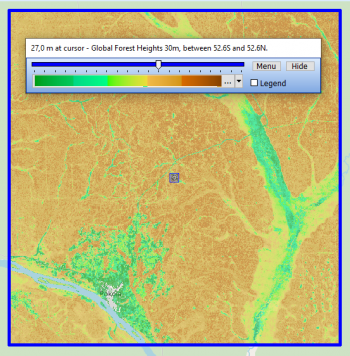Near-Global Forest Canopy Heights GLAD: Difference between revisions
No edit summary |
|||
| Line 4: | Line 4: | ||
== Introduction == | == Introduction == | ||
The Near Global Forest Canopy Height (GLAD, 2019) is a dataset developed from a fusion of GEDI lidar data (Global Ecosystem Dynamics Investigation Lidar) and Landsat imagery data. This dataset has a near global spatial coverage ranging from latitudes 52.6S to 52.6N. Currently (2020) it is to be considered as a prototype map as both machine learning algorithms and available data are still being being improved. The dataset was developed by the Global Land Analysis and Discovery (GLAD) laboratory in the Department of Geographical Sciences at the University of Maryland. The data reflects the 95% relative height of the canopy. In the current version, tree heights beyond 30m are saturated by the model used. | The Near Global Forest Canopy Height (GLAD, 2019) is a dataset developed from a fusion of GEDI lidar data (Global Ecosystem Dynamics Investigation Lidar) and Landsat imagery data. | ||
This dataset has a near global spatial coverage ranging from latitudes 52.6S to 52.6N. | |||
Currently (2020) it is to be considered as a prototype map as both machine learning algorithms and available data are still being being improved. | |||
The dataset was developed by the Global Land Analysis and Discovery (GLAD) laboratory in the Department of Geographical Sciences at the University of Maryland. | |||
The data reflects the 95% relative height of the canopy. In the current version, tree heights beyond 30m are saturated by the model used. | |||
=== Usage Notes === | === Usage Notes === | ||
Revision as of 14:11, 8 September 2020

Introduction
The Near Global Forest Canopy Height (GLAD, 2019) is a dataset developed from a fusion of GEDI lidar data (Global Ecosystem Dynamics Investigation Lidar) and Landsat imagery data.
This dataset has a near global spatial coverage ranging from latitudes 52.6S to 52.6N.
Currently (2020) it is to be considered as a prototype map as both machine learning algorithms and available data are still being being improved.
The dataset was developed by the Global Land Analysis and Discovery (GLAD) laboratory in the Department of Geographical Sciences at the University of Maryland.
The data reflects the 95% relative height of the canopy. In the current version, tree heights beyond 30m are saturated by the model used.
Usage Notes
- Point 1
- Point 2
Availability from within WindPRO
Data Type and Use in windPRO
Coverage
This dataset covers the world, between .
License
Acknowledgement
- Point
- Point
External Links
- Link
- Link